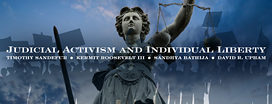Lead Essay
Left and right agree that activist judges are bad. But the concept of activism is ultimately quite fuzzy, and it may even interfere with the work that judges should be doing. When courts defer too much, the legislature’s power grows beyond its constitutional bounds. Answering the question of how active our judges should be requires answering what exactly they should be doing; Sandefur’s answer is that judges should strenuously enforce the Constitution against the other branches of government. Failing to do so not only leaves bad law in place, it thwarts the will of the people as expressed in the Constitution.
Response Essays
Kermit Roosevelt III discusses judicial activism and restraint. He finds neither is always appropriate: A theory of when judges properly strike down laws will not necessarily hang on how many laws they strike down. Judges, though, are not necessarily better at deciding economic questions, and they may do harm either by upholding or by striking down a law. Either of these harms may fall on powerless minorities. Identifying legislation that is simply the product of favoritism or rent-seeking is an enduring challenge, not one that can be settled with a theory of activism or restraint.
Sandhya Bathija argues that restrained courts have done best to protect rights from the interests of the wealthy and powerful. Among the three branches of government, Congress has done the most to rein in the power of big business, and this is overwhelmingly for the good of the people. That result shouldn’t be so surprising, as Congress is the most democratic branch of our government. Sandefur’s vision of the judiciary would paralyze the federal government and would constitute “an assault on people with disabilities, racial minorities, women, LGBT Americans, and the poor.”
David R. Upham argues the Founders intended a significant democratic element to our Constitution; fidelity to it requires some judicial restraint. The branches of the federal government are coequal, and deference to elected legislatures is consistent with the Founders’ principles. It is also reasonable, in that legislatures cannot act before they have cleared significant procedural hurdles, increasing the chance that their work will reflect considered judgment about the Constitution. Examples of improper but democratically enacted legislation oppressing minorities so far advanced have been inapposite.
The Conversation
Coming Up
Discussion among all participants to continue through the end of the month.
Related at Cato
Book forum: The Conscience of the Constitution: The Declaration of Independence and the Right to Liberty, January 30, 2014, with Timothy Sandefur
Debate: Is Judicial Restraint the Proper Response to Judicial Activism?, October 21, 2012, with Roger Pilon
Book forum: David’s Hammer: The Case for an Activist Judiciary, April 3, 2007, with Clint Bolick

